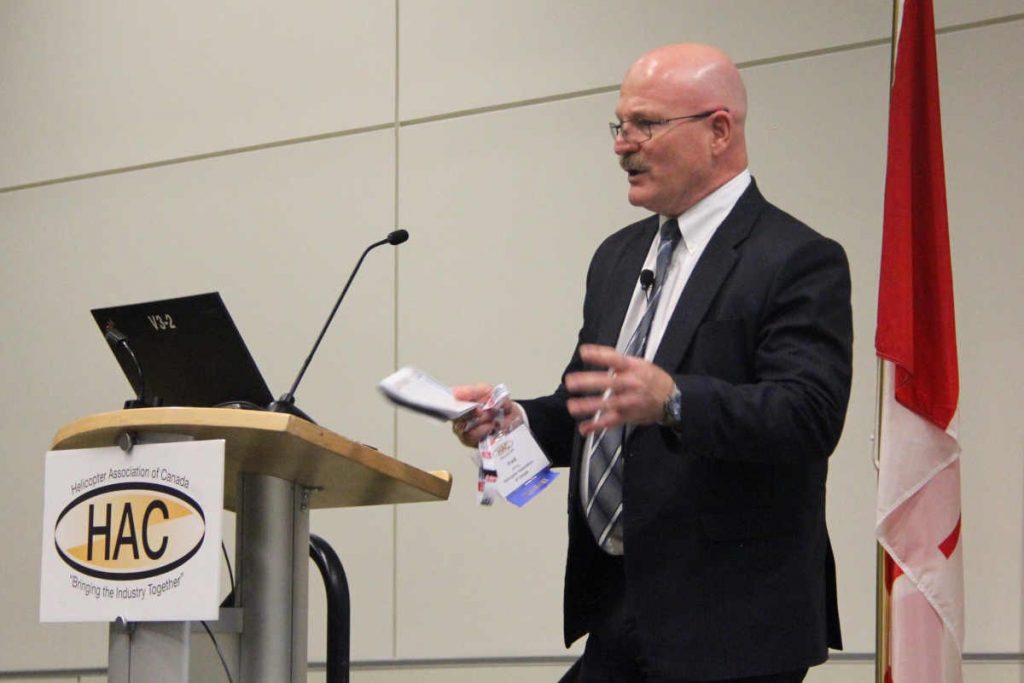
Features
Commercial
Adapting to the New Normal
July 16, 2020 By Fred Jones
An opportunity to engage industry members who need interaction
 Fred Jones speaking at HAC's conference in 2019.
Fred Jones speaking at HAC's conference in 2019. COVID-19 is changing the way that we think about most everything from personal and social relationships to business interactions. Will the hospitality and tourism industry ever be the same in the age of social distancing? Associations have long understood that members benefit significantly from networking with customers, suppliers and – in most industries – even their competitors. In an industry that understands that relationships thrive on personal interaction, the association business may very well be conducted in a very different way.
Unless we develop a vaccine, can we ever let our guard down when it comes to an infectious disease like coronavirus that can be asymptomatic but highly contagious – particularly in a global economy, where individuals are traveling internationally with regularity? As we well know, Canada can reduce its infection rate to near-zero, but all it takes is a large gathering of people, and one or two asymptomatic infected people, to spike the infection rate, again.
But will video conferencing ever become a substitute for face-to-face business connections? Will trade shows ever be the same with masks and elbow-bumping?
The worst part of the pandemic drove people to try video meetings and training. The technology certainly presents opportunities for group interaction or training for people in different locations, but will it every be a substitute for face-to-face interaction; and how enduring will the use of technology be in the new post-Coronavirus age? It is unlikely that our businesses will ever return to the old normal. We have already seen how working-from-home will affect the use of conventional office space in our major cities. We know that major companies are re-examining the value of office space – they are leaving, without any expectation of coming back.
We know that Provincial and local governments have been allowed to set their own pace for a staged return to business, as local and regional circumstances allow. As much as some would like a return to the old ways of doing business, I believe that it is unlikely to occur.
The lasting effect of our Canadian experience with COVID-19 will be felt through four primary factors: 1) the availability of a vaccine; 2) public comfort levels with domestic and international travel; 3) the social distancing precautions that are in place in any given country or region; and 4) the ability of Canada to respond in a timely way to hot-spot outbreaks of Coronavirus (or the next similar outbreak).
At least in the near-term, we can expect a gradual return to a hybrid convention model that will include the ability for remotely located individuals to participate at some level by video; and a modified trade show model that will reflect the four factors described above.
Ever-the-optimist, the pandemic experience will present some new opportunities as well. Associations are adapting to offer new leadership – helping members locate and navigate government programs; and offering their members new online learning opportunities. Associations will need to adapt to video conferencing and other online tools to engage and support their members.
Associations can use these new tools to leverage their government relations efforts more effectively. The new technology has the potential to offer a more efficient mechanism for stakeholders and their associations to interact with their regulators – that is, of course, if the government can ever embrace commonly used software that will make that possible. It also has the potential to return some of the face-to-face contact that we lost when the CARAC process was largely reduced to an administrative exchange of correspondence.
Associations will use more Webinars and new tools for member engagement, and find ways to help their members cope with the new normal. In short, associations will be better able to gauge and respond to the needs of their members, in meaningful ways.
As Charles Darwin is often quoted as saying, “It is not the strongest of the species that survives, nor the most intelligent that survives. It is the one that is most adaptable to change.” The same can be said of associations and we intend to use the challenging circumstances we are currently experiencing to propel HAC and its members to change to better suit the needs of the industry.
Fred Jones is president and CEO of the Helicopter Association of Canada.